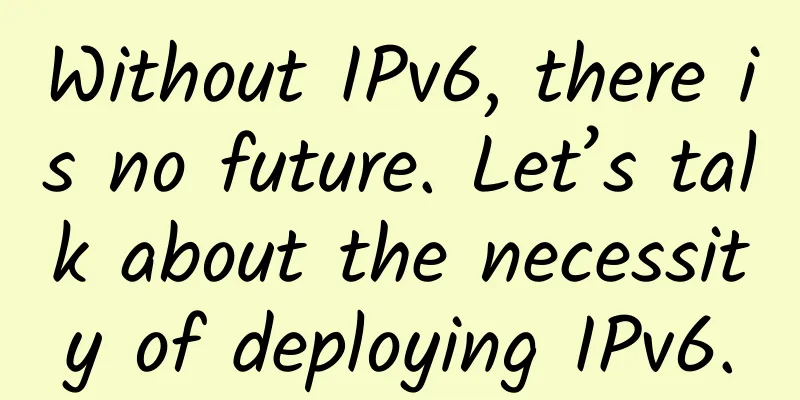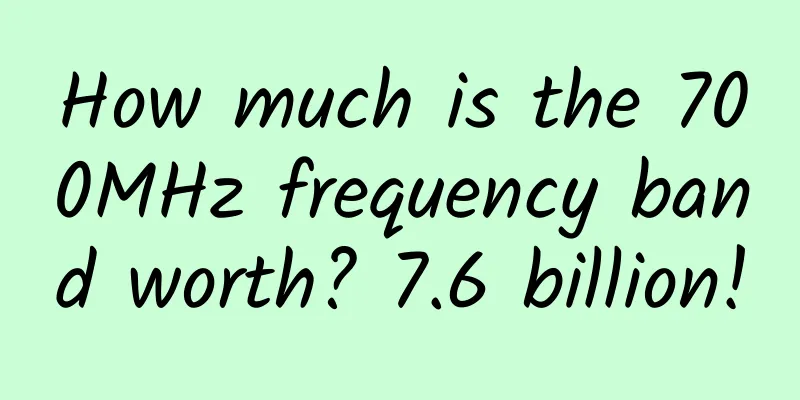Without IPv6, there is no future. Let’s talk about the necessity of deploying IPv6.

|
The first large-scale IPv6 transformation was in 2012 when the Ministry of Information Industry issued a document requiring the three major operators to transform their basic networks. At that time, nearly 80% of the networks of the three major operators had been transformed. However, domestic Internet companies such as Tencent and Alibaba have not been proactive, resulting in a lack of IPv6 resources available in my country. Therefore, I think the initial IPv6 transformation was a half-finished project.
At the end of 2017, the "Action Plan for Promoting Large-Scale Deployment of Internet Protocol Version 6 (IPv6)" was released, which is divided into three phases. 2018 is the initial stage, and the main goal is to urge Internet OTT, operators' basic bearer networks, IDCs, and major government and public institutions to have basic IPv6 support capabilities. The state has interviewed OTT companies such as Tencent, Alibaba, and Baidu. Currently, these Internet companies have started IPv6 transformation. At the same time, some large and medium-sized state-owned enterprises and government portals already have IPv6 capabilities. So we can see that in 2018, Alibaba has announced its full support for IPv6 for the industry. This is for this reason. It is not because Alibaba has a change of heart, but it has to do it. By 2019, we have entered the second phase. The goal of the second phase is that by the end of 2020, IPv6 traffic must account for 50%, new networks will no longer use IPv4, and top Internet applications, enterprises, institutions, operators' fixed and mobile networks must all support IPv6 commercial use. If the initial stage is to have IPv6 capabilities, the goal of the second phase is to migrate the application of major traffic and support IPv6 end-to-end. Many friends in enterprises and institutions always ask, why do we have to use IPv6? Some self-media are boastful, and when it comes to IPv6, they talk about "whether there is a war or not". In fact, what I want to popularize is that IPv6 is just a network technology. If a network technology can determine the outcome of a war, then my country would have lost long ago. The reason is very simple. According to CNNIC statistics, the IPv6 development level of developed countries in the world is at least 2-3 years ahead of my country. So, the reason why we need to deploy IPv6 is very simple. The comprehensive deployment of IPv6 is a necessary requirement for the future technological development of our country, and it is also an inevitable requirement for our national network security. IPv6 is an inevitable requirement for the future development of science and technology and industry in my country, because the Internet of Things and cloud computing will be more efficient using IPv6 addresses. The global IPv4 public network addresses were exhausted in 2012. Originally, everyone could use IPv4 private network addresses plus NAT to access the Internet, and we have been using private network IPv4 addresses for many years without any problems. However, the future is the era of Industry 4.0, where the Internet of Things, cloud computing, and AI are top priority technologies. These technologies require a massive amount of address Internet. If NAT is used for all of them, it is equivalent to adding a device to the network for conversion for no reason. NAT's support for application protocols is relatively poor, and the efficiency of NAT conversion is relatively low. In addition, the delay of the Internet of Things signal will be greatly affected after passing through the NAT device. If IPv4 private network address planning and management is used to support cloud and IoT, the workload is huge and error-prone, and the efficiency is very low. However, IPv6 can give each IoT terminal a public network address, and each terminal can directly and efficiently access the IPv6 cloud server, which is of course more efficient, has a wider range of application scenarios, and a more reliable network. Secondly, IPv6 is indeed closely related to my country's national security. DNS is an essential service for the Internet. The global IPv4 DNS root servers are in the United States, Japan and other Western developed countries. This means that my country's network lifeline is not actually in its own hands. If the United States cuts off the root server, then all Chinese networks will be blind. With the advancement of Internet+, the Chinese government, finance and other national lifeline industries are now fully based on the Internet, and even the future Industry 4.0 will be all based on 5G. The control of DNS by the United States means that Western countries can paralyze the Chinese government, finance and industry at any time. I remember that recently Russia deliberately tested the situation of isolating the Internet from the West in order to deal with the potential threat of the country's lifeline being completely Internet-based. In the IPv6 era, my country has its own DNS root server. Having our own root server means that Western countries cannot cut us off. From a national security perspective, IPv6 is much safer. Therefore, my country vigorously promotes the deployment of IPv6 in the entire industry. First of all, this is necessary for industrial transformation and is a good partner for the technology required for Industry 4.0. Secondly, it is to fully guarantee my country's national security in the Internet + era and avoid threats from the West. This is the fundamental reason. |
<<: 9 killer apps for edge computing
>>: How to Understand Fog Computing and Edge Computing in Simple Terms
Recommend
5G is not only faster, but also safer!
As major operators begin to offer 5G packages, th...
How to “prevent” programmers from slacking off at work?
[[344451]] This article is reprinted from the WeC...
Why Microsoft won't rebuild Windows based on the Linux kernel
A few weeks ago, the opinion of Eric S Raymond, a...
Five hybrid video conferencing tips for effective collaboration
[[417444]] When Pixoul, a Dallas-based web design...
The next generation of Internet communication networks is about to be deployed. Is IPv6 security protection ready?
Recently, the General Office of the Communist Par...
Single machine million TCP connection test source code
[[382120]] This article is reprinted from the WeC...
TCP network stuff! Three-way handshake, four-way handshake, TIME-WAIT, HTTP 2.0 ....
[[419435]] Hello everyone, I am Tom~ Today I will...
How to share WiFi gracefully when the password is hard to reveal
"What's your home WiFi password?" T...
Analysis on the current status of global 5G development
[[417613]] This article is reprinted from the WeC...
What is the appropriate number of Goroutines? Will it affect GC and scheduling?
[[387141]] This article is reprinted from the WeC...
5G, where is the road ahead? Computer experts look ahead to the 5G era
[[348682]] Data released by the Ministry of Indus...
After the mixed-ownership reform, can China Unicom seize the opportunity to make a comeback in 5G?
Image source: Visual China Among China's thre...
China Telecom has introduced seven new measures to increase speed and reduce fees
On May 25, China Telecom released its 2019 action...
How operators benefit from NaaS
Network as a Service (NaaS) is increasingly popul...
CheapWindowsVPS: $4.5/month KVM-4GB/60GB/1Gbps unlimited traffic/7 data centers available
The last time I shared information about CheapWin...









